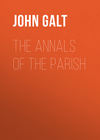Kitabı oku: «The Life, Studies, and Works of Benjamin West, Esq.», sayfa 8
Part II
To Simon M'Gillivray, Esq.
This Work
Is inscribed, with every sentiment of esteem, by the Author.
Preface
Nearly the whole of this work was printed during the last illness of Mr. West. The manuscript had long previously been read to him. My custom was, to note down those points which seemed, in our conversations, to bear on his biography, and, from time to time, to submit an entire chapter to his perusal; afterwards, when the whole narrative was formed, it was again carefully read over to him. Still, however, I am apprehensive that some mistakes in the orthography of names may have been committed; for although the same custom was strictly observed in preparing the manuscript of the first part of his Memoirs for the press, yet, in perusing the proofs, he found several errors of that kind. It was intended that he should have read the proofs of this part also, but the progress of his disease unfortunately rendered it impracticable.
J.G.
30th March, 1820.
Introduction
Although Mr. West was, strictly speaking, a self-taught artist, yet it must be allowed that in his education he enjoyed great and singular advantages. A strong presentiment was cherished in his family, that he would prove an extraordinary man, and his first rude sketch in childhood was hailed as an assurance of the fulfilment of the prediction of Peckover. The very endeavours of his boyish years were applauded as successful attainments; no domestic prejudices were opposed to the cultivation of his genius; even the religious principles of the community in which he lived were bent in his favour, from a persuasion that he was endowed by Heaven with a peculiar gift; and whatever the defects of his early essays may have been, it was not one of the least advantageous circumstances of his youth, that they were seen only by persons, who, without being competent judges of them, as works of art, were yet possessed of such a decided superiority of intellect, that their approbation in any case would have been esteemed great praise.
The incidents attending his voyage to Italy, and his introduction to the artists, virtuosi, and travellers at Rome, were still more auspicious. Taken in connection with his previous history, they form one of the most remarkable illustrations of the doctrine of fortune, or destiny, that is to be found in authentic biography. Without any knowledge of his abilities or acquirements, his arrival in the capital of Christendom, the seat of the arts, was regarded as an interesting event: his person was contemplated as an object of curiosity; and a strong disposition to applaud his productions, was excited by the mere accident of his having come from America to study the fine arts. A prepossession so extraordinary has no parallel. It would almost seem, as if there had been some arrangement in the order of things that would have placed Mr. West in the first class of artists, although he had himself mistaken the workings of ambition for the consciousness of talent. Many men of no inconsiderable fame have set out in their career with high expectations in their favour; but few, of whom such hopes were entertained, have, by a succession of works, in which the powers of the mind were seemingly unfolded with more and more energy, so long continued to justify the presentiments of his early friends. It is not, however, the object of this undertaking to form any estimate of the genius of Mr. West, or of the merits of his works; another opportunity, distinct from his memoirs, will be taken for that purpose; but only to resume the narrative of his progress, in his profession, by which it will appear that a series of circumstances no less curious than those which tended to make him an artist, facilitated his success, and placed him in that precise station in society, where, in this country, at the time, there was the only chance of profitable employment as an historical painter.
Chap. I
Mr. West arrives in England. – Relative Condition of Artists in Society. – Mr. West's American Friends in this Country. – Of Governor Hamilton and Mr. Allen, – Circumstances favourable to their Reception in the Circles of Fashion. – Mr. West's Visit to Bath, and Excursions to see some of the Collections of Art in England. – He settles as a Portrait Painter. – Introduction to Burke and Dr. Johnson. – Anecdote of a Monk, the Brother of Mr. Burke. – Introduction to Archbishop Drummond. – Mr West's Marriage.
Mr. West arrived in England on the 20th of August, 1763. The sentiments with which he approached the shores of this island, were those of a stranger visiting interesting scenes, mingled with something of the solicitude and affections of a traveller returning home. He had no intention of remaining in London: he was only desirous to see the country of his ancestors, and his mind, in consequence, was more disengaged from professional feelings than at any period from that in which his genius was first awakened. He considered his visit to England as devoted to social leisure, the best kind of repose after mental exertion; but the good fortune which had hitherto attended him in so remarkable a manner, still followed him, and frustrated the intentions with which he was at that time actuated.
Those who have at all attended to what was then the state of the arts in this country, and more particularly to the relative condition of artists in society, and who can compare them with the state of both at the present period, will not hesitate to regard the arrival of Mr. West as an important event. In the sequel of this work, it may be necessary to allude to the moral and political causes which affect the progress of the fine arts, and opportunities will, in consequence, arise to show how meanly they were considered, how justly, indeed, it may be said, they were rejected, not only by the British public in general, but even by the nobility. A few eminent literary characters were sensible of their importance, and lamented the neglect to which they were consigned; but the great body of the intelligent part of the nation neither felt their influence, nor were aware of their importance to the commerce and renown of the kingdom. Artists stood, if possible, lower in the scale of society than actors; for Garrick had redeemed the profession of the latter from the degradation to which it had been consigned from the time of the Commonwealth; but Reynolds, although in high repute as a portrait-painter, and affecting a gentlemanly liberality in the style of his living, was not so eminently before the public eye as to induce any change of the same consequence towards his profession.
Mr. West found, on his arrival in London, several American families who had come across the Atlantic after the peace to visit their relations, and he had the unexpected pleasure of hearing that Mr. William Allen, Governor Hamilton, and Dr. Smith, his earliest friends and patrons, were in this country.
Mr. Allen, like many others in the colonies at that time, was both a professional man and a merchant. He held indeed the dignified office of chief justice in Pennsylvania, and was a person of powerful and extensive connections in the mother-country. Hamilton, who had been many years governor, was chiefly indebted to him for the rank which he enjoyed, in consequence of having married his sister.
The naval and military officers who had occasion, during the war, to visit Philadelphia, found in the houses of the governor and Mr. Allen a cordial hospitality which they never forgot. Many of these officers were related to persons of distinction in London, and being anxious to testify to the Americans their grateful sense of the kindness which they had experienced, rendered the strangers objects of hospitable solicitude and marked respect in the first circles of the metropolis. Mr. West, accordingly, on his arrival, participated in the advantages of their favourable reception, and before he was known as an artist, frequented the parties of several of the highest characters in the state.
His first excursion from London was to Hampton Court to see the Cartoons of Raphael. Soon after, he visited Oxford, Blenheim, and Corsham; whence he proceeded to Bath, where Mr. Allen was at that time residing. Here he remained about a month; and in returning to town made a short tour, in the course of which he inspected the collections of art at Storehead, Fonthill, Wilton House, the Cathedral of Salisbury, and the Earl of Radnor's seat at Longford. At Reading he staid some time with his half-brother, Mr. Thomas West, the eldest son of his father. When he returned to London he was introduced by Mr. Patoune, his travelling companion from Rome, to Reynolds, and a friendship commenced between them which was only broken by death. He also, much about the same time, formed an acquaintance with Mr. Richard Wilson, the landscape painter, to whom indeed he had brought very warm letters of introduction, from some of that great artist's friends and admirers in Italy.
The first lodgings which Mr. West occupied, in his professional capacity, were in Bedford-Street, Covent-Garden, where, when it was understood that he intended to practise, he was visited by all the artists of eminence then in London, and welcomed among them with a cordiality that reflected great honour on the generosity of their dispositions. In this house the first picture which he painted in England was executed. The subject was Angelica and Medora, which, with the Cymon and Iphiginia, painted at Rome, and a portrait of General Moncton, (who acquired so much celebrity by his heroic conduct as second in command under General Wolfe at Quebec,) by the advice of Reynolds and Wilson, he sent to the exhibition in Spring Gardens in 1764.
While he was engaged on the picture of Angelica and Medora, Dr. Markham, then Master of Westminster-School, paid him a visit and invited him to a dinner, at which he introduced him to Dr. Johnson, Mr. Burke; Mr. Chracheroide, and Mr. Dyer. On being introduced to Burke he was so much surprised by the resemblance which that gentleman bore to the chief of the Benedictine monks at Parma, that when he spoke he could scarcely persuade himself he was not the same person. This resemblance was not accidental; the Protestant orator was, indeed, the brother of the monk.
It always appeared to Mr. West that there was about Mr. Burke a degree of mystery, connected with his early life, which their long intercourse, subsequent to the introduction at Dr. Markham's, never tended to explain. He never spoke of any companions of his boyhood, nor seemed to have any of those pleasing recollections of the heedless and harmless days of youth, which afford to most men of genius some of the finest lights and breaks of their fancy; and his writings corroborate the observation. For, although no prose writer ever wrote more like a poet than this celebrated man, his imagery is principally drawn from general nature or from art, and but rarely from any thing local or particular.
The conversation after dinner chiefly turned, on American subjects, in which Mr. Burke, as may well be supposed, took a distinguished part, and not more delighted the Artist with the rich variety and affluence of his mind, than surprised him by the correct circumstantiality of his descriptions; so much so, that he was never able to divest himself of an impression received on this occasion, that Mr. Burke had actually been in America, and visited the scenes, and been familiar with many of the places which he so minutely seemed to recollect. Upon a circumstance so singular, and so much at variance with all that has hitherto been said respecting the early history of this eminent person, it is needless to dilate. The wonder which it may excite I have no means of allaying; but I should not omit to mention here, when Mr. Burke was informed that Mr. West was a Quaker, that he observed, he had always regarded it among the most fortunate circumstances of his life, that his first preceptor was a member of the Society of Friends.
Dr. Markham in 1765 introduced Mr. West to Dr. Newton, Bishop of Bristol, Dr. Johnson, Bishop of Worcester, and Dr. Drummond, Archbishop of York. Dr. Newton engaged him to paint the Parting of Hector and Andromache, and afterwards sat to him for his portrait, in the back ground of which a sketch of this picture was introduced: and for the Bishop of Worcester he painted the Return of the Prodigal Son. The encouragement which he thus received from these eminent divines was highly creditable to their taste and liberality, and is in honourable contrast to the negligence with which all that concerned the fine arts were treated by the nobility and opulent gentry. It is, however, necessary to mention one illustrious exception. Lord Rockingham offered Mr. West a regular, permanent engagement of £700 per annum to paint historical subjects for his mansion in Yorkshire: but the Artist on consulting his friends found them unanimously of opinion, that although the prospect of encouragement which had opened to him ought to make him resolve to remain in England, he should not confine himself to the service of one patron, but trust to the public. The result of this conversation was a communication to Dr. Smith and Mr. Allen, of the attachment he had formed for the lady whom he afterwards married, and that it was his intention to return to America in order to be united to her. In consequence of this, an arrangement took place, by which the father of Mr. West came over to this country with the bride, and the marriage was solemnised on the 2d of September, 1765, in the church of St. Martin in the Fields.
Chap. II
Some Notice of Archbishop Drummond. – Mr. West paints a Picture for His Grace. – His Grace's Plan to procure Engagements for Mr. West as an Historical Painter. – Project for ornamenting St. Paul's Cathedral with Pictures. – Anecdote of Dr. Terrick, Bishop of London. – The Altarpiece of St. Stephens, Walbrook. – State of public Taste with respect to the Arts. – Anecdotes of Hogarth and Garrick.
In Archbishop Drummond Mr. West found one of the most active and efficient patrons that he had yet met with. This eminent prelate was esteemed, by all who enjoyed the pleasure of his acquaintance, for a peculiar dignity of mind, and a liberality of sentiment that reflected lustre on his exalted rank. He had in his youth travelled on the Continent, and possessing an innate sensibility to the moral influence of the fine arts, had improved his natural taste by a careful inspection of every celebrated work to which he could obtain access. He lamented that in this great, flourishing, and triumphant nation, no just notion of the value of the fine arts was entertained; and on all occasions, when a suitable opportunity presented itself, he never failed to state this opinion, and to endeavour to impress it on others. He frequently invited Mr. West to his table; and the Artist remarked that he seemed to turn the conversation on the celebrity which the patronage of the arts had in all ages reflected on the most illustrious persons and families, addressing himself with particular emphasis to his sons. In the course of one of these conversations, he engaged Mr. West to paint for him the story of Agrippina landing with the ashes of Germanicus, and sent one of the young gentlemen to the library for the volume in which Tacitus describes the circumstances. Having read the passage, he commented on it at some length, in order to convey to Mr. West an idea of the manner in which he was desirous the subject should be treated.
The painter, on returning home, felt his imagination so much excited by the historian's description, and the remarks of the Archbishop, that he immediately began to compose a sketch for the picture, and finished it before going to bed. Next morning he carried it to His Grace, who, equally surprised and delighted to find his own conception so soon embodied in a visible form, requested the Artist to proceed without delay in the execution of the picture.
In the interim, the Archbishop endeavoured, by all the means in his power, to procure encouragement for Mr. West to devote himself exclusively to historical composition; and with this view he set on foot a scheme to raise three thousand guineas to constitute a fund, which would be a sufficient inducement for the Artist, in the first instance, to forego, at least for a time, the drudgery of portrait painting. But the attempt failed: so little was the public disposed to patronise historical subjects from the pencil of a living artist, that after fifteen hundred pounds were subscribed, it was agreed to relinquish the undertaking. As this fact is important to the history of the progress of the arts in this country, I present my readers with a copy of the subscription-paper, with the names and amount of the sums attached to them, by the respective subscribers,
In 1766 Mr. West made a proposal to his friend Bishop Newton, who was then Dean of St. Paul's, to present a gratuitous offering to the Cathedral, by painting a religious subject to fill one of the large spaces which the architect of the building had allotted for the reception of pictures; and speaking on the design one day after dinner at the Bishop's when Reynolds was present, he said that the giving of the Law on Mount Sinai would make an appropriate subject. Reynolds was delighted with the idea of decorating St. Paul's by the voluntary offerings of artists, and offered to paint a Nativity as his contribution. A formal proposal was in consequence made to the Dean and Chapter, who embraced it with much satisfaction. But Dr. Terrick, the Bishop, felt some degree of jealousy at the design being adopted, without consulting him, and set himself so decidedly against it that it was necessarily abandoned. Dr. Newtorn had, in his capacity of Dean, obtained (without reflecting that Terrick had a veto over all) the consent of the other curators of the Cathedral, namely, of the Lord Mayor, the Archbishop of Canterbury, and the King. "But," exclaimed Dr. Terrick, with the energy of an ancient martyr, "I have heard of the proposition, and as I am head of the Cathedral of the metropolis, I will not suffer the doors to be opened to introduce popery." It is to be hoped that the declaration proceeded from the fear implied, and not because Dr. Newton omitted to ask his consent before applying to the King and the Archbishop.
Mr. West was, however, too deeply impressed with the advantage which would accrue to the arts by inducing the guardians of the Church to allow the introduction of pictures, to be discouraged by the illiberality of the Bishop of London. He therefore made a proposal to paint an Altar-piece for the beautiful church of St. Stephen's, Walbrook, and it was accepted. In the same year his friend, Mr. Wilcox, gave him a commission to execute another sacred subject, which he presented to the Cathedral of Rochester, and it is placed over the communion-table. In these biographical sketches it cannot be expected that a history of all Mr. West's numerous works should be related. It is the history of the Artist, not of his works, that is here written; and, therefore, except where the incidents connected with them are illustrative of the state of public feeling towards the arts, it is unnecessary to be more particular. I have, however, prepared a complete catalogue of his designs, with such remarks concerning them as must satisfy any want that may be felt by this systematic omission in the narrative. I should, however, mention that, in this stage of his career, the two of his earliest pictures, which attracted the greatest share of public attention, were the Orestes and Pylades, and the Continence of Scipio. He had undertaken them on speculation, and the applause which they obtained, when finished, were an assurance of his success and reward. His house was daily thronged with the opulent and the curious to see them; statesmen sent for them to their offices; princes to their bedchambers, and all loudly expressed their approbation, but not one ever enquired the price; and his imagination, which had been elevated in Italy to emulate the conceptions of those celebrated men who have given a second existence to the great events of religion, history, and poetry, was allowed in England to languish over the unmeaning faces of portrait-customers. It seemed to be thought that the genius of the Artist could in no other way be encouraged, than by his friends sitting for their own likenesses, and paying liberally for them. The moral influence of the art was unfelt and unknown; nor can a more impressive instance of this historical truth be adduced, than the following anecdote of Hogarth, which Garrick himself related to Mr. West.
When that artist had published the plates of the Election, he wished to dispose of the paintings, and proposed to do so by a raffle of two hundred chances, at two guineas the stake; to be determined on an appointed day. Among a small number of subscribers, not half what Hogarth expected, Garrick had put down his name; and when the day arrived he went to the artist's house to throw for his chance. After waiting a considerable time no other person appeared, and Hogarth felt this neglect not only as derogatory to his profession, but implying that the subscription had something in it of a mendicant character. Vexed by such a mortifying result of a plan which he had sanguinely hoped would prove, at least, a morning's amusement to the fashionable subscribers, he insisted that, as they had not attended, nor even sent any request to him to throw for them, that Garrick should go through the formality of throwing the dice; but only for himself. The actor for some time opposed the irritated artist; but at last consented. Instead, however, of allowing Hogarth to send them home, he begged that they might be carefully packed up, until his servant should call for them; and on returning to his house, he dispatched a note to the painter, stating that he could not persuade himself to remove works so valuable and admired, without acquitting his conscience of an obligation due to the author and to his own good fortune in obtaining them. And knowing the humour of the person he addressed, and that if he had sent a cheque for the money it would in all probability be returned, he informed him that he had transferred two hundred guineas at his bankers, which would remain at the disposal of Hogarth or his heirs, whether it was or was not then accepted. The charge of habitual parsimony against Garrick was not well founded; and this incident shows that he knew when to be properly munificent. In the acquisition and management of his affluent fortune, it would have been more correct to have praised him for a judicious system of economy, than to have censured him for meanness. It ought to have been considered, that he was professionally required to deal with a class of persons not famed for prudence in pecuniary concerns, and to whom the methodical disbursements of most private gentlemen would probably have appeared penurious.










